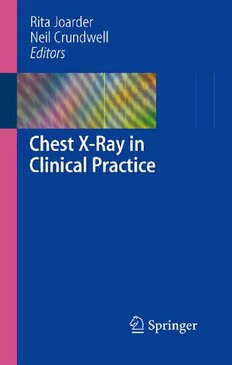
Chest X-Ray in Clinical Practice PDF
Preview Chest X-Ray in Clinical Practice
Chest X-Ray in Clinical Practice · Rita Joarder Neil Crundwell Editors Chest X-Ray in Clinical Practice 123 Editors Dr.RitaJoarder Dr.NeilCrundwell ConquestHospital ConquestHospital TheRidge TheRidge St.Leonards-On-Sea St.Leonards-On-Sea EastSussex EastSussex UnitedKingdomTN377RD UnitedKingdomTN377RD [email protected] [email protected] ISBN978-1-84882-098-2 e-ISBN978-1-84882-099-9 DOI10.1007/978-1-84882-099-9 SpringerDordrechtHeidelbergLondonNewYork BritishLibraryCataloguinginPublicationData AcataloguerecordforthisbookisavailablefromtheBritishLibrary LibraryofCongressControlNumber:2009926729 (cid:2)c Springer-VerlagLondonLimited2009 Apartfromanyfairdealingforthepurposesofresearchorprivatestudy,or criticismorreview,aspermittedundertheCopyright,DesignsandPatents Act1988,thispublicationmayonlybereproduced,storedortransmitted,in anyformorbyanymeans,withthepriorpermissioninwritingofthepublish- ers,orinthecaseofreprographicreproductioninaccordancewiththeterms oflicensesissuedbytheCopyrightLicensingAgency.Enquiriesconcerning reproductionoutsidethosetermsshouldbesenttothepublishers. Theuseofregisterednames,trademarks, etc.,inthispublication does not imply,evenintheabsenceofaspecificstatement,thatsuchnamesareexempt fromtherelevantlawsandregulationsandthereforefreeforgeneraluse. Thepublishermakesnorepresentation,expressorimplied,withregardto theaccuracyoftheinformationcontainedinthisbookandcannotacceptany legalresponsibilityorliabilityforanyerrorsoromissionsthatmaybemade. Coverdesign:eStudioCalamarS.L. Printedonacid-freepaper SpringerispartofSpringerScience+BusinessMedia(www.springer.com) ‘ToMartin,Alfred,Arnold,andFreddie, foryourunceasingsupportand inspiration’RitaJoarder ‘ToLesleyandSebastianforshowingme life’sbeautifulthings’NeilCrundwell Preface Thechestradiograph(chestX-ray)isthemostcommonlyre- questedexamination,anditisprobablythehardestplainfilm tointerpretcorrectly.Accurateinterpretationcangreatlyin- fluence patient management in the acute setting. It is, how- ever, often performed out of hours and the interpretation is undertakenbyrelativelyjuniormembersofstaffwithnoim- mediate senior support or radiological input. Despite the in- creasing availability of more complex radiological investiga- tions,thechestX-raycontinuestoberequestedasafirst-line investigationandthisislikelytocontinue. The structure of this book derives from many teaching sessions that have been given to junior doctors and medi- cal students. The authors have found that, in general, teach- ingregardingchestX-rayinterpretationhadlackedaformal structuredapproach,andjuniordoctorsandmedicalstudents foundinterpretingachestX-raydifficult.Givingthemastruc- tured approach allowed them to feel they could tackle inter- pretationwithmoreconfidence. Weaimtoprovideaportablehandbookforjuniordoctors. The structure is based upon those lectures that the authors havegiven.Thebookitselfisintendedtobeeasilyaccessible and to help this we have included tables containing the key teachingpoints,toalloweasyreference.Wehaveincludedex- tensiveexamplesofcommonpathologies.Thisbookis,how- ever,notanexhaustiveworkofreference. We have included basic information on how a chest X-ray isperformedandhowsuchperformancefactorscanaffectthe quality of the image. We consider the implications of radia- tion dose and give details of basic normal anatomy. We then explainwhynormalstructuresappearastheydoonthechest vii viii Preface X-ray.Theabilitytointerpretthenormaliskeytointerpret- ingtheabnormalandweexplainwhyabnormalitiescreatethe imagingfeaturestheydo. Using a structured logical approach, we focus on both anatomical abnormality and more generalized patterns of lungdisease. Our ultimate aim is to equip the reader with a confident, simplebutlogicalapproachtochestX-rayinterpretation. R.Joarder N.Crundwell Acknowledgments We would like to acknowledge Christina Worley for all her hardworkinpreparingthemanuscript. We would also like to acknowledge the following for their valuable contribution to this book: Steve Page, DCR, MSc, Conquest Hospital, St Leonards-On-Sea, East Sussex, UK, and Andrew Develing, DipMDI, Conquest Hospital, St Leonards-On-Sea,EastSussex,UK ix Contents Preface............................................. vii Acknowledgments .................................. ix PartI 1 ChestRadiography ............................. 3 1.1. RadiographicTechnique .................... 4 1.1.1. Postero-anterior(PA) ................ 4 1.1.2. Antero-posterior .................... 6 1.1.3. Lateral ............................. 7 1.1.4. Obliques............................ 9 1.1.5. PenetratedPostero-anterior .......... 12 1.1.6. Inspiration/ExpirationPostero-anterior 12 1.1.7. ApicalLordotic ..................... 12 1.2. KeyPoints................................. 13 2 The Normal Chest X-ray: An Approach toInterpretation................................ 15 2.1. UnderstandingNormalAnatomy ............ 17 2.2. ReviewAreas.............................. 22 2.3. Pseudo-abnormalitiesonaNormalFilm ...... 24 2.4. KeyPoints................................. 27 PartII 3 TheMediastinumandHilarRegions ............. 31 3.1. MiddleMediastinumandHilarRegions ...... 34 xi xii Contents 3.1.1. CardiacAbnormality................. 34 3.1.2. HilarAbnormalities ................. 42 3.1.3. OtherMiddleMediastinalAbnormalities 45 3.2. AnteriorMediastinum ...................... 48 3.3. PosteriorMediastinum...................... 49 3.3.1. HiatusHernia ....................... 51 3.3.2. Gastric Pull Through Following Oesophagectomy .................... 51 3.3.3. OesophagealDilatation .............. 53 3.3.4. Descending Thoracic Aortic Abnormalities ....................... 54 3.4. KeyPoints................................. 54 4 BasicPatternsofLungDisease .................. 55 Introduction.................................... 55 4a Consolidation .................................. 57 4.1. ExamplesofConsolidationandItsCauses .... 60 4.1.1. Infection............................ 60 4.1.2. PulmonaryOedema.................. 63 4.1.3. Malignancy ......................... 64 4.1.4. Haemorrhage ....................... 65 4.2. KeyPoints................................. 66 4b Collapse ....................................... 67 4.3. LobarCollapse............................. 67 4.4. RightLung ................................ 68 4.5. LeftLung ................................. 70 4.6. WholeLungCollapse....................... 72 4.7. KeyPoints................................. 73 4c Lines .......................................... 74 4.8. LeftVentricularFailure ..................... 77 4.9. NormalAgeingLungs ...................... 79 4.10.LymphangitisCarcinomatosis ............... 80 4.11.Fibrosis ................................... 81 4.12.LowerZoneFibrosis ....................... 82 4.13.UpperZoneFibrosis ....................... 83
